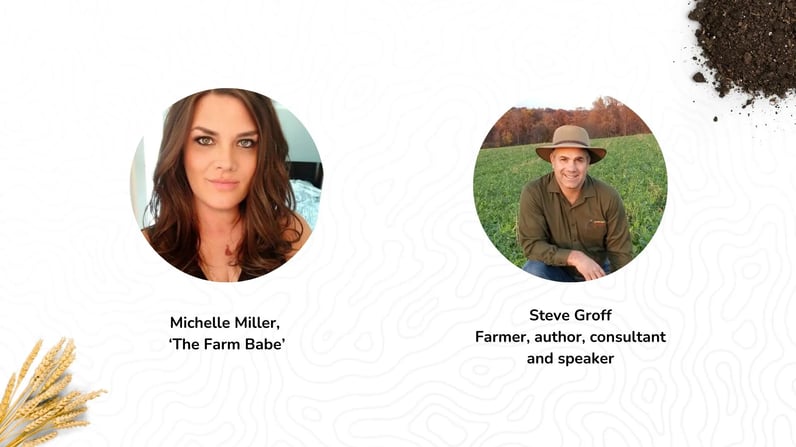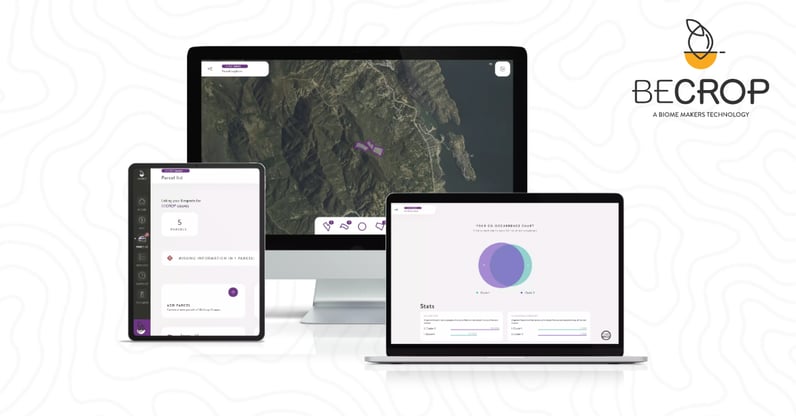Share this
The Digital Revolution in Agriculture
by Jamie Nix on 13/Sep/23
From Soil Health to High-Tech Farming
Farmers have always been eager to use new technology, and the popularity of advancements in agricultural technology exemplifies this.
In this article, we’ll discuss several different aspects of this movement; from the role of online influencers, to soil analysis, to the broader process of using digital technologies for new ways of working with the soil microbiome and evidence-based decision-making.
The growing voice of Ag influencers
Digital and social media influencers play an essential part in the digitalization of agriculture. For example, Steve Groff and Michelle Miller (who’s known online as ‘The Farm Babe’) have taken their farm expertise online and work toward bridging the gap between farmers and consumers in the United States. Reaching millions of users on social platforms, they play a crucial role in informing people about the importance of improving soil health.

The digital turn in on-farm operations
The digitization of farm practices is only going to increase, with the global market of agricultural technology expected to reach $22.5 billion by 2026.
Right now, drones are being used to check if crops need more water, sensors are helping to measure when it's time to harvest, and DNA biological soil tests are being done to make farming better.
With such advancements in agricultural technology, growers employ precision farming and ultimately increase the efficiency of their fields.
As Dr. Oscar Ruiz from Waypoint Analytical points out, “I think that incorporating this type of technology is an indispensable tool that allows you to monitor soil quality and determine which biostimulant/biological products and management practices provide the best ROI”. Let’s dive into the importance of digitized soil analysis further.
Webinar insights: Combining traditional knowledge with technology
We recently held a webinar with Michelle Miller, in which we uncovered the resilience of Midwest row crops.
The farm we discussed is a corn and soybean farm based in Iowa that has been using regenerative practices, including no-till cover crops for over 25 years. This particular farm is resilient to disease and doesn’t use pesticides or fungicides. To find out why there haven't been significant disease issues in recent years, they sent Biome Makers 5 samples to analyze using BeCrop® tests.
Our team looked at the biocontrol agents in the test results. Biocontrol agents examine the microbes that suppress pests and pathogens. Essentially, the hope with regenerative agriculture practices is that you cultivate populations of fungicide agents that help you suppress those pathogens, and that’s exactly what happened on this farm in Iowa. The test results showed that this increased amount of fungicide agents plays a huge role in disease suppressiveness.
This grower represents the growing technological movement within the agricultural community; farmers are balancing traditional farming knowledge with technological advancements.
In this case, the digitization of soil analysis provided the grower with evidence that his soil-health-focused practices were building resilience to disease, ultimately allowing him to make evidence-based decisions and stay competitive in the market.

Key takeaways
Technology plays a pivotal role in shaping the future of agriculture, and growers are embracing the advancements more and more every day. Visionary influencers like Steve Groff and Michelle Miller accelerate this transformation, building awareness around soil health and other important aspects of agriculture. With the AgTech market expected to grow by the billions, the future holds exciting opportunities for farmers and their fields.
Share this
- June 2025 (2)
- September 2024 (1)
- August 2024 (1)
- July 2024 (1)
- June 2024 (2)
- May 2024 (2)
- April 2024 (2)
- March 2024 (1)
- February 2024 (1)
- January 2024 (1)
- November 2023 (1)
- October 2023 (1)
- September 2023 (1)
- August 2023 (2)
- July 2023 (2)
- May 2023 (2)
- April 2023 (3)
- March 2023 (3)
- February 2023 (2)
- January 2023 (1)
- November 2022 (1)
- October 2022 (2)
- September 2022 (1)
- August 2022 (3)
- July 2022 (3)
- June 2022 (1)
- May 2022 (5)
- April 2022 (7)
- August 2021 (1)
- July 2021 (1)
- May 2021 (1)
- April 2021 (4)
- November 2020 (3)
- October 2020 (4)
- September 2020 (1)
- August 2020 (3)
- July 2020 (1)
- June 2020 (1)
- May 2020 (2)